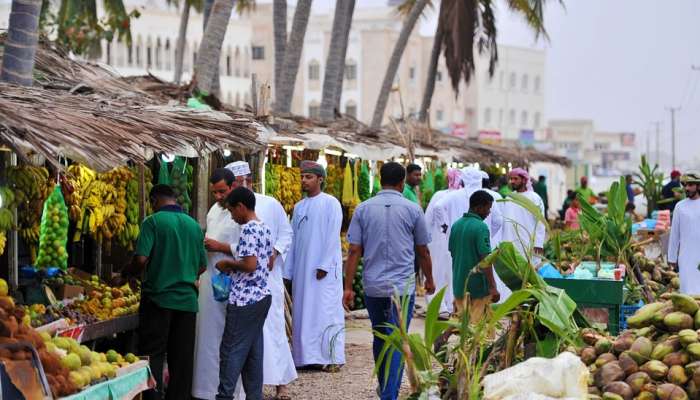
Muscat: Tourists and visitors to the Dhofar Governorate are keen to visit the kiosks selling local fruits and vegetables in the city of Salalah, especially during the Khareef season.
They use water pipe (called mishli locally) to drink juice from the coconut shells, in addition to buying fruits and some local tropical fruits such as bananas and favai.
The seasonal climatic conditions that characterise the Dhofar Governorate and the Salalah Plain in particular have provided cultivations of various types of fruits and vegetables, some of which are produced throughout the year.
The coconut plants are at the forefront of agricultural crops and constitute the largest cultivated area in the Salalah Plain.
Among the most important agricultural products that characterise the Dhofar Governorate are coconuts (nargile), or as it is known locally (mishli), in addition to bananas, lemons, guava, favai, tomatoes, zucchini, and other fruits and vegetables that are displayed at kiosks to attract visitors and residents of Salalah, especially in the season.
Khareef visitors prefer to buy fresh fruits picked from trees on the sides of the roads that cross the orchards and farms.
The agricultural plain extends from the east to the west of the city of Salalah and includes fertile orchards full of fruit trees and seasonal vegetables. Hookah trees decorate the streets of the governorate, creating beautiful natural scenery.
The Salalah Agricultural Plain is also characterised by the abundance of other agricultural crops, including favai and bananas, which require environmental and climatic conditions suitable for tropical and subtropical regions with moderate and humid weather.
Its crops contribute to increasing the productivity of the agricultural sector in the Sultanate of Oman, one of the important productive sectors.
The Salalah Plain is famous for growing the banana crop, which is one of the most important economic and food crops in the governorate, and its cultivation is widely spread in the Salalah Plain due to the availability of suitable climatic and environmental conditions.
The Salalah Plain is also famous for its favai tree, which is evergreen and fast-growing, and its fruit is distinguished by its quality, and quantity, as it can be compared to best international varieties in different regions of the world.
Autumn is the best season for growing and planting favai fruit, which is characterised by many benefits of health and nutrition.
It is worth noting that the Salalah Agricultural Plain produces a number of other agricultural crops that contribute to achieving food security, in addition to its contribution to the marketing and export of some agricultural crops inside and outside the Sultanate of Oman, such as lemon, guava, papaya, tomatoes, zucchini, sugar cane, guava, pomegranate, berries, avocado, sour cream fruit. Locally, crops of corn, pepper, zucchini, cucumber, eggplant, watercress, lettuce, sweet potatoes, and legumes are also grown.